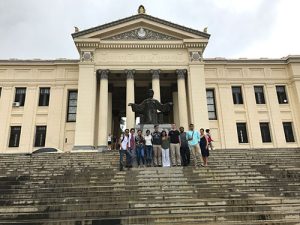
Last March the Journey Cuba Study Abroad class, led by Professors Anne Prucha and Kacie Tartt, traveled to Cuba. During the week-long trip, the group of eight students and two faculty members visited the cities of Havana, Cojimar, and Viñales, and kept journals of their daily learning experiences, not as tourists, but as students immersed in the island nation’s unique culture.
In the weeks leading up to the trip, the students researched Cuban history, politics, geography, economy, music, and art, and presented their findings. The class was treated to guest lectures from UCF professors of history, literature, and art, and participated in Q & A sessions.
The trip itinerary included a tour of Old Havana, an observation of a U.S. Embassy briefing, various museum tours, a University of Havana tour, visits to Las Terrazas self-sustaining farming community and Valle de Silencio tobacco farm, and more.
One of the travelers, Adam Manno, a journalism and political science major, decided to enroll in the course because “Cuba is at such an interesting point in its post-revolutionary history, and I wanted to be there to see this change happen for myself…I wanted to take a critical and analytical look for myself before the country’s tourist presence became it becomes too overbearing.”
As a journalism and political science student, Adam chose to focus primarily on Cuba’s media and the government’s role in the news.
“Talking in class about how Cuba is rated 171/180 by the World Press Freedom Index is one thing. Actually being there and seeing how the state-run news apparatus works was another. When we visited the university, I had a hard time imagining how a student could get the most out of their education when the news sources that were most readily available couldn’t really be trusted to be independent and objective. Still, Cubans are very aware of their government and how information is repressed, so that was often a comforting sight.”
Of his daily journal entries, he says, “…one thing I found myself writing about was my tourist guilt regarding the food. [In Cuba] food is rationed by the government for its citizens each month…. As tourists, however, we had the money to go to the best state-run restaurants and paladares, which are privately-owned, licensed restaurants that are often run out of people’s homes. Eating that well was definitely the source of a lot of discomfort and deep thought.”
Another traveler, Gabriela Parpia, an interdisciplinary studies major and pre-dental student, especially enjoyed exploring Old Havana and learning about the history and culture. In regards to the unique art and architecture in the city, she said, “It’s something that you’ll never see in the United States.”
Gabriela was also able to gain insight into the differences between the U.S. and Cuba in terms of healthcare when the group visited a dental clinic and spoke to dental and medical students.
Overall, students were able to gain a rich understanding of the politics, media, culture and daily life in Cuba. The trip offered a unique, insightful and educational perspective one would not have access to if simply vacationing in Cuba.
Prucha and Tartt are now in the process of renewing the program for Spring Break 2018. Details about the course and applications for new students will be available in Fall 2017. Any interested students may contact the directors via email: Anne.Prucha@ucf.edu or Kacie.Tartt@ucf.edu.